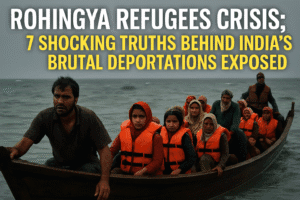Rohingya Refugees Crisis: 7 Shocking Truths Behind India’s Brutal Deportations Exposed
The United Nations has demanded an investigation into India’s alleged forced deportation of Rohingya refugees, including reports of abandoning groups at sea near Myanmar’s coast with only life jackets. These actions, condemned as “inhumane” by UN experts, follow a broader crackdown targeting Muslim minorities under the guise of national security, fueled by recent tensions with Pakistan. Survivors describe being detained without due process and expelled via naval vessels, with some refugees reportedly reaching Myanmar’s resistance-held areas after perilous journeys.
India, which denies Rohingya formal refugee status, faces criticism for violating international human rights principles, particularly as returnees risk persecution under Myanmar’s military regime. Bangladesh has accused India of pushing hundreds into its territory informally, straining regional relations. Legal challenges in India’s courts have failed to halt deportations, amplifying concerns over rising Hindu nationalism and systemic discrimination. The crisis underscores the ethical collapse of refugee protections in the face of political opportunism, urging global accountability and humane solutions for vulnerable populations..

Rohingya Refugees Crisis: 7 Shocking Truths Behind India’s Brutal Deportations Exposed
The United Nations has demanded an urgent investigation into alarming reports that Indian authorities forcibly deported Rohingya refugees, allegedly abandoning them at sea near Myanmar’s coast. These actions, described by the UN as “inhumane and life-threatening,” have intensified scrutiny of India’s treatment of displaced minorities and raised urgent questions about the ethical responsibilities of nations toward refugees.
A Crisis Rooted in Persecution
The Rohingya, a predominantly Muslim ethnic group, have faced decades of systemic violence in Myanmar, culminating in a 2017 military crackdown the UN labeled as genocidal. Over a million fled to neighboring countries, including India, which hosts an estimated 20,000 Rohingya. Despite their vulnerable status, India—not a signatory to the UN Refugee Convention—has historically classified them as “illegal immigrants,” denying them formal protections.
Crackdowns Under the Guise of Security
Recent deportations coincide with heightened tensions between India and Pakistan following a terrorist attack in India last month. While officials framed the expulsions as a national security measure, activists argue the campaign disproportionately targets Muslims. In states like Gujarat and Rajasthan, thousands were detained, many later released after proving citizenship. However, Rohingya and Bangladeshi migrants faced swift deportation, even those holding UN refugee cards.
Disturbing testimonies reveal harrowing details:
- Sea Deportations: Refugees claim Indian naval vessels left groups in the Andaman Sea with only life jackets, forcing them to swim toward Myanmar. One survivor, Sadeq Shalom, reported his brother among 40 individuals abandoned at sea, later rescued by Myanmar’s resistance forces.
- Family Separations: New Delhi resident David Nazir described his elderly parents being detained and deported without due process.
Regional Repercussions and Legal Challenges
Bangladesh, already hosting over a million Rohingya, condemned India’s “informal” pushbacks across their shared border. Dozens were stranded in the Sundarbans mangrove forest, requiring rescue by Bangladesh’s coast guard. Meanwhile, India’s Supreme Court rejected pleas to halt deportations, despite arguments that returnees face persecution in Myanmar, where a military junta remains in power.
Global and Domestic Backlash
UN Special Rapporteur Tom Andrews condemned the actions as “outrageous,” urging accountability. Human rights groups like India’s People’s Union for Civil Liberties criticized the lack of due process, emphasizing that even undocumented migrants deserve legal recourse. Comparisons have emerged to controversial U.S. deportation practices, underscoring a global pattern of marginalizing vulnerable populations.
The Bigger Picture: Nationalism vs. Human Rights
Critics view these deportations as part of a broader agenda under Prime Minister Narendra Modi’s Hindu nationalist government, which has increasingly marginalized Muslim communities. Policies like the Citizenship Amendment Act (2019), which fast-tracks citizenship for non-Muslim migrants, further reflect this bias. The Rohingya crisis thus becomes a litmus test for India’s commitment to human rights amid rising majoritarianism.
Pathways Forward
The crisis demands multilateral solutions:
- International Pressure: The UN must push for transparent investigations and advocate for Rohingya rights under international law.
- Regional Cooperation: ASEAN and South Asian nations should collaborate on equitable burden-sharing, rather than unilateral expulsions.
- Domestic Reform: India needs a formal refugee framework to prevent arbitrary detentions and uphold humanitarian obligations.
As the world grapples with record displacement, India’s actions serve as a stark reminder of the consequences when security narratives override compassion. For the Rohingya, already survivors of genocide, justice remains elusive—both in their homeland and in the countries they hoped would offer sanctuary. Their plight challenges the global community to reimagine solidarity in an era of borders and divisions.
You must be logged in to post a comment.